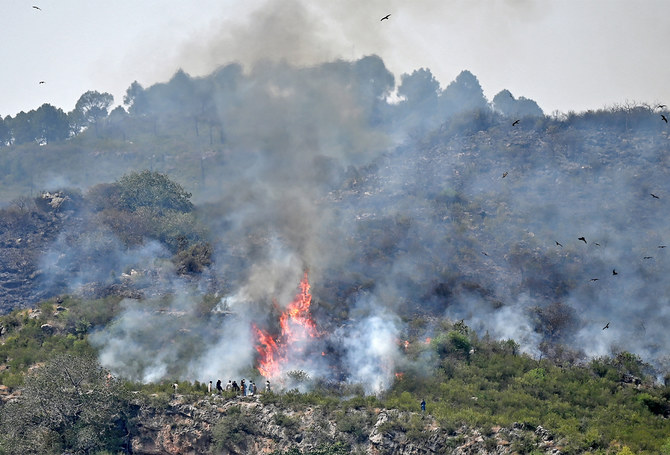ISLAMABAD: Forest fire incidents have increased in the Margalla Hills in Pakistan’s federal capital during the course of this year, said climate change minister Sherry Rehman on Wednesday, due to unusual rise in temperature in recent months that has led to hot and dry conditions.
Stretched between the northern edge of Islamabad and south of Haripur district in Khyber Pakhtunkhwa province, the hills have witnessed several fires in the past which were mostly caused by human error.
The Margalla Hills National Park covers an area of over 31,000 acres and is mostly situated in the capital city, Islamabad.
“Fires in Margalla Hills have increased this year due to unusual rise in temperature from March onwards, resulting in severe and prolonged hot and dry conditions,” Rehman told a media briefing while quoting a United Nations report that attributes 50 percent forest fires to the negative impact of changing environment.
“Climate change has become a national security issue,” she added. “All government departments and citizens have to fight it together to minimize its adverse impact on society.”
The minister informed that fire broke out on three different places in the hills on Wednesday, adding that two of them had been controlled while teams were working to extinguish the third one.
Speaking to Arab News, chief fire officer of Metropolitan Corporation Islamabad Zafar Iqbal said there had been a 20 percent increase in fire incidents in the hills this year due to the hot and dry weather supplemented by human error.
“In the last two months, about 50 incidents of fire were reported in the Margalla Hills, green belts, and other surrounding areas of Islamabad,” he said. “Out of these, nearly 15 were major fires.”
Iqbal said some local residents, who lived in and around Islamabad and were associated with timber mafia who intentionally put trees on fire to hide their theft of wood.
Director of Islamabad Wildlife Management Board Dr. Tariq Bangash told Arab News his organization had established a 24-hour patrolling mechanism to prevent fire incidents and deal with them at an early stage.
“We have installed six pickets in the Margalla Hills to ensure quick response and hired an additional temporary staff of 60 people for three months to monitor and respond to fires this year,” he said.
Bangash noted that good coordination between the Capital Development Authority (CDA) and his own staff members had resulted in a significant reduction in response time, adding this had helped the administration control serious fires within hours instead of days.
“We controlled five fire incidents on Tuesday, including two major fires, within 10 to 12 hours due to collective response,” he said.
CDA environment director Rana Kashif maintained the administration was using all resources to control incidents of fire while informing it had prepared walking tracks in the hills to ensure easy access to affected areas.
“In case of fire, we usually use our manpower to control it through bush beating since traditional fire controlling vehicles cannot be moved to these areas,” he told Arab News. “When there is a large fire, we hire helicopters from other departments as well.”
Director National Weather Forecasting Center Dr. Zaheer Ahmed Babar said fire incidents would significantly decrease by the end of June when monsoon rains were expected.
“We expect the start of monsoon by the end of this month,” he said. “It will break the spell of hot and dry weather which will contribute to the reduction of forest fires.”
Babar said these fires would not have a significant impact on the overall temperature of the capital, though they could affect the surrounding areas.
















